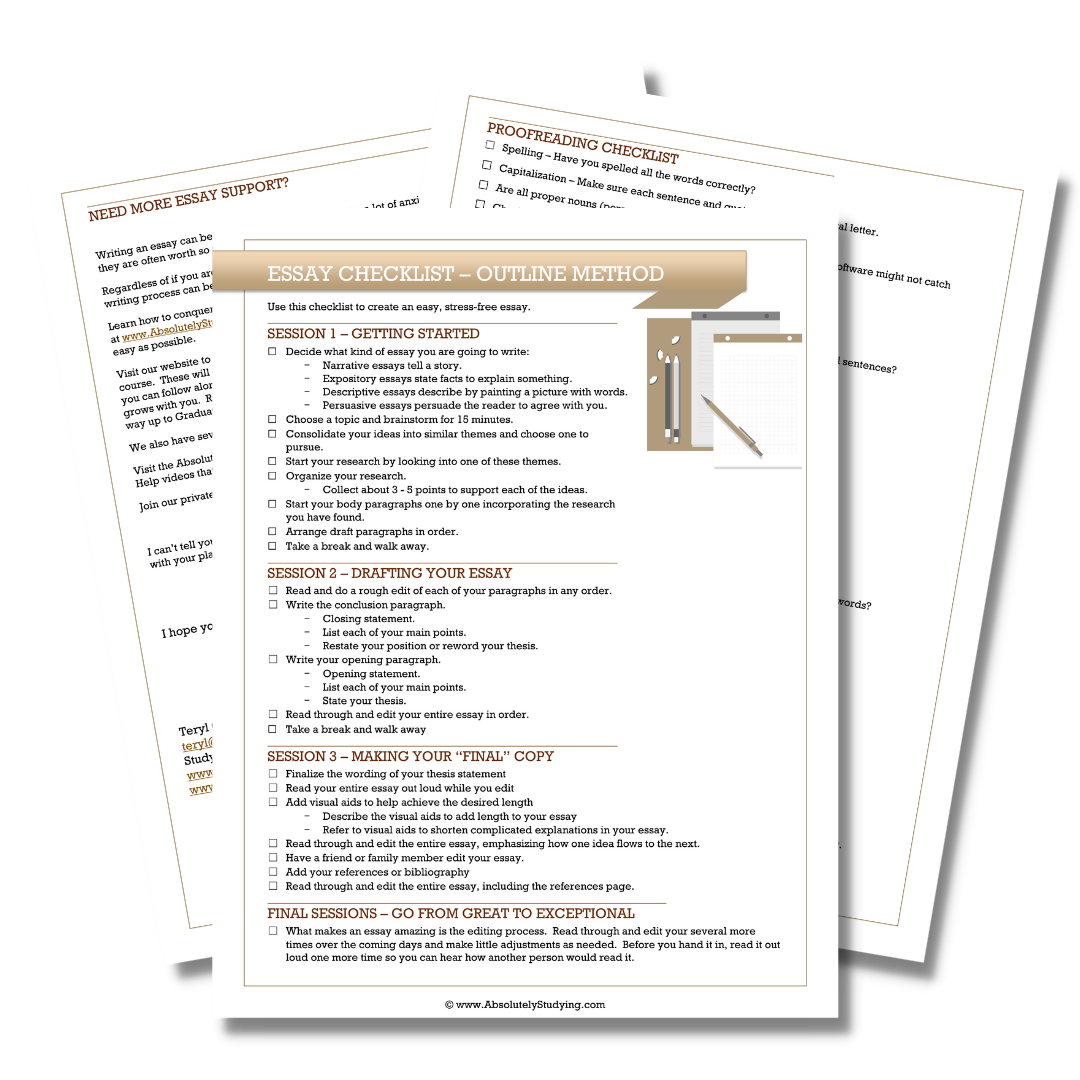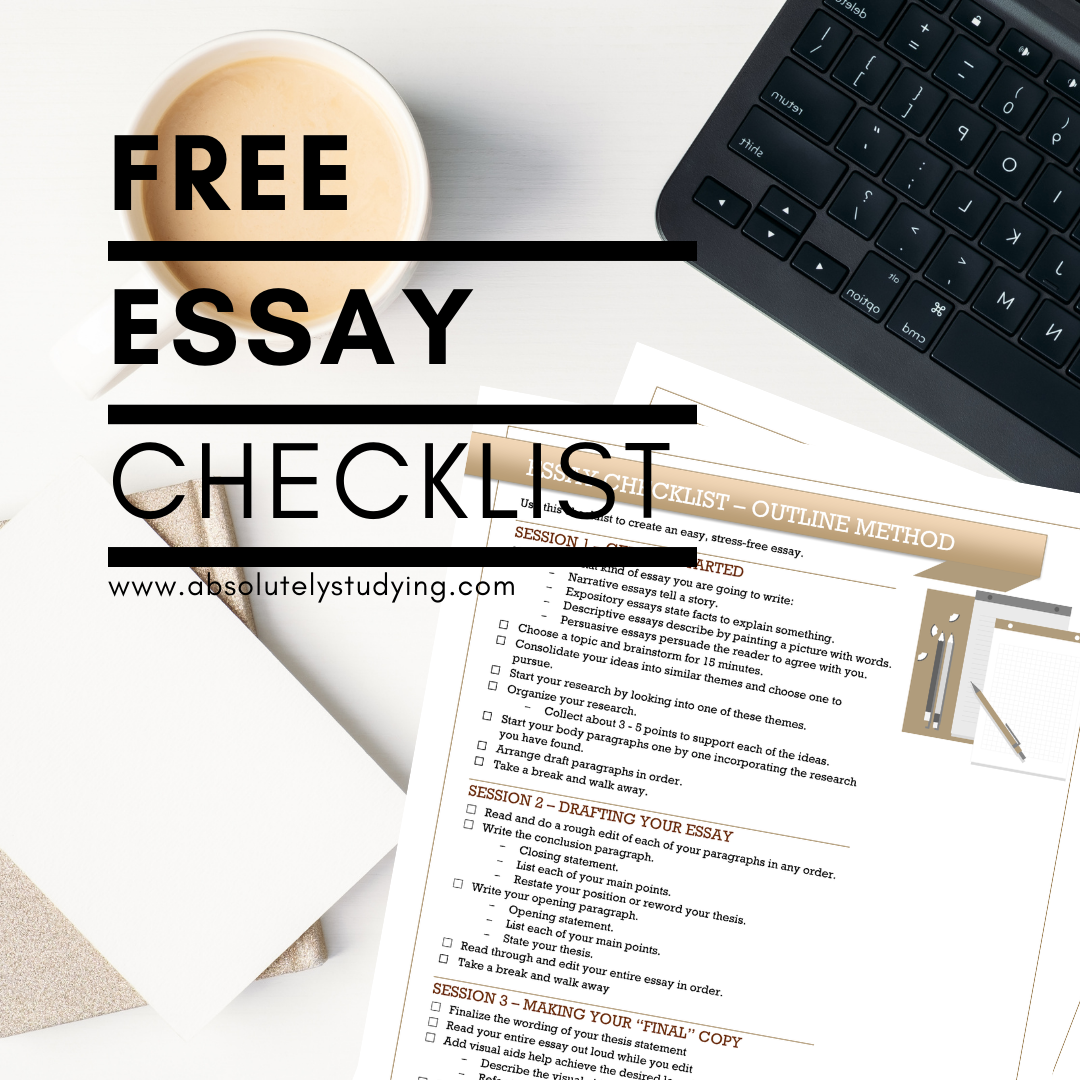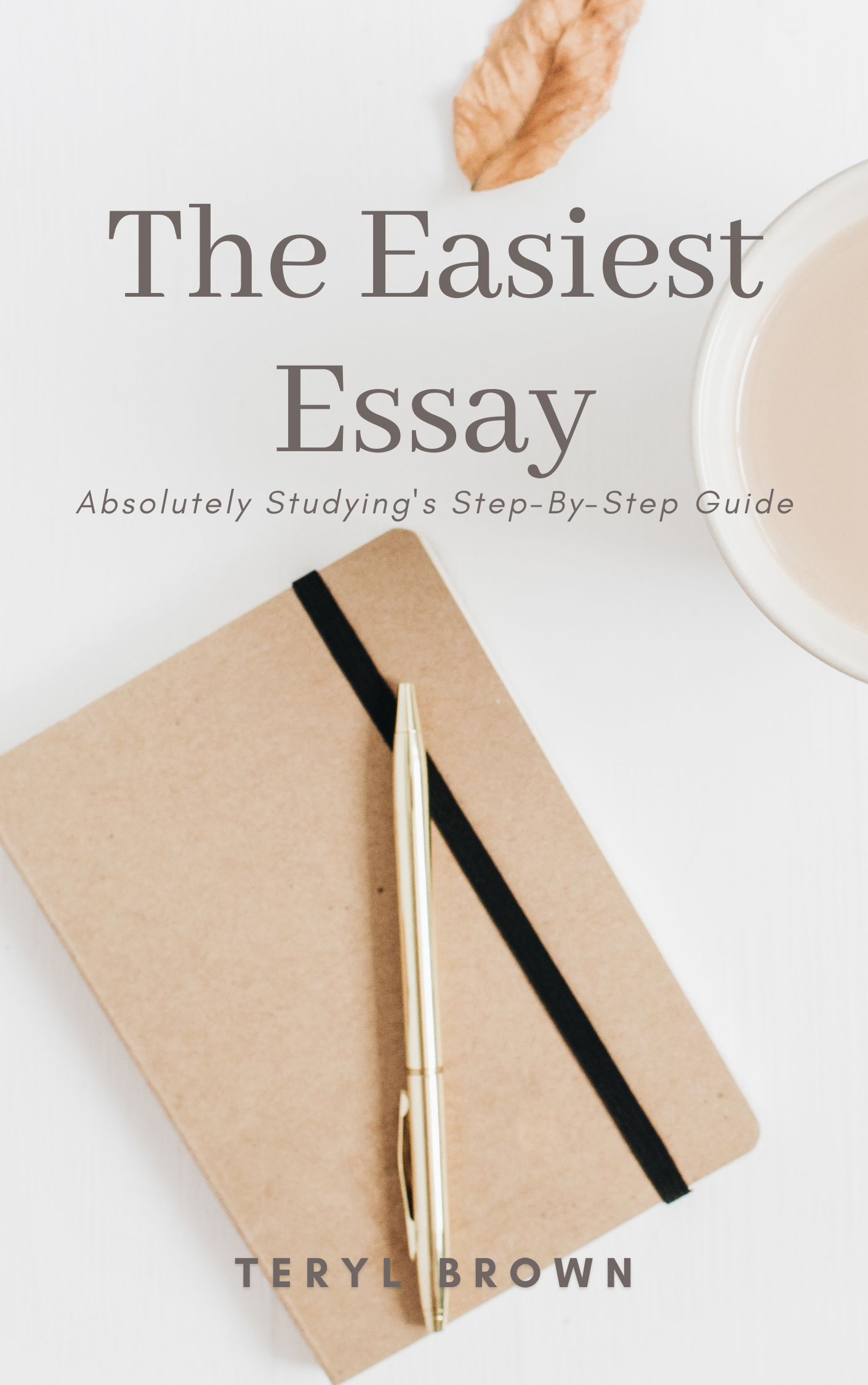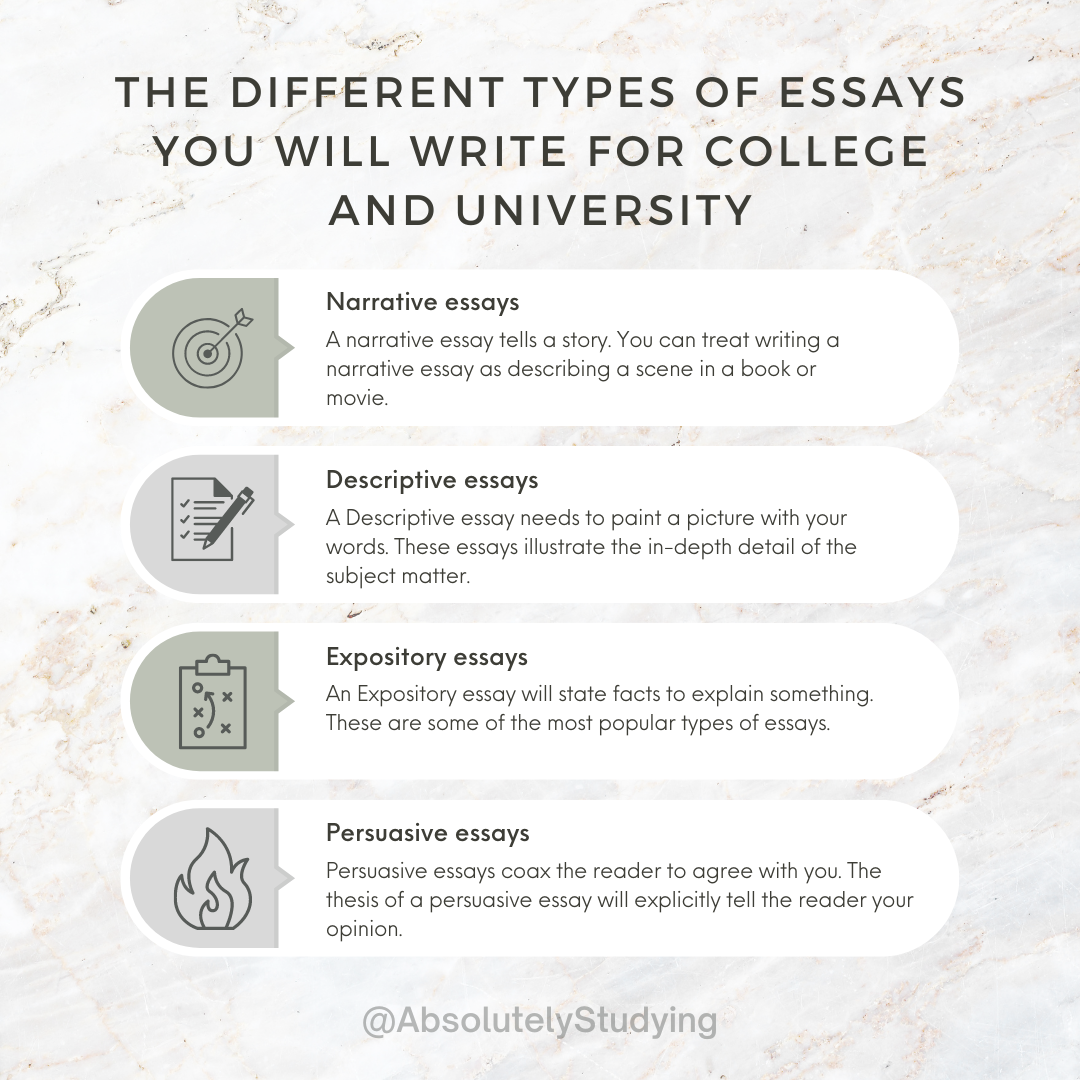The Different Types of Essays You Will Write for College and University
The Types of Essays Explained
What are the different types of essays you will be expected to write?
Essay Writing & Proofreading Checklist
This checklist will guide you through the process of:
Choosing a subject
Creating your draft
Revising your essay
Proofreading step-by-step
Getting it ready to submit
This easy-to-follow guide will lead you through the entire process quickly and efficiently.
* Disclaimer * Some of the posted links are affiliate programs. By clicking these links, I may receive monetary compensation. This will not alter the price or change the buyer's experience.
There are four basic types of essays and several more "sub-types." This may be why you often hear that there are eight or even twelve essay types at times.
We will discuss the first four main categories for simplicity's sake and break them into more niche essay types. First, it is essential to understand the main differences to fully grasp the nuances of how various essay types can differ.
Don't get overwhelmed by the fact that there are so many different types of essays. The truth is they all share the same basic structure and organization. This will never change.
You will always be required to have an:
Introduction with a thesis statement.
Body to discuss all of the supporting arguments.
Conclusion to summarize your main points.
We examine all of this in detail in our post about the organization of your essay. Because of this, we won't hash that out again here. Instead, we will dive into how each essay type differs and address any similarities that might arise. This way, you will have the best chance at nailing your format and getting the best grade possible.
Essay Writing & Proofreading Checklist
This easy-to-follow guide will lead you through the entire process quickly and efficiently.
What are the different types of essays?
When looking at the big picture, there are 4 types of essays. These catch-all categories can be broken down into subspecialized groups that we will discuss later.
Each of these essays has a distinct tone and purpose. This is why it is so important to understand the difference between them. Applying the wrong writing technique to an essay can result in mixed messages or an unclear objective that can confuse the reader and impact your grade.
Basic essay types:
Narrative essays
Descriptive essays
Expository essays
Persuasive essays
Narrative essays
A narrative essay tells a story. You can treat writing a narrative essay as describing a scene in a book or movie. This is one of the few instances where you can illustrate things from a first-person point of view.
These essays are more informal than other types. But it can get complicated very quickly. Try to keep them to a linear storyline and the characters limited. Instead, create drama and excitement by using the length to describe details of the world you are creating for your audience.
The thesis of a narrative essay should tell the reader something about the journey they are about to go on. That is not to say that you should spoil the ending, but foreshadowing is a definite hit. If the story is about justice, perhaps a thesis referring to cosmic karma would be a hint that could pique your readers' interest.
Descriptive essays
A Descriptive essay needs to paint a picture with your words. These essays illustrate the in-depth detail of the subject matter. They can be about anything from a person or place to an object or idea.
This is another creative type of essay, and you can use many stylistic elements to evoke emotions in the reader. You want them to be immersed in the imagery you create for them. So, they can get lost in the experience and fully visualize what you are trying to communicate.
This is another case where keeping the subject of the description simple is a huge help. If you are describing a scene or a situation, keep it simple. Then use the length of the essay to do a deep analysis and description of everything happening.
Readers love to dive into details; the more descriptive you can get, the better you have done your job. Your thesis statement would introduce the reader to what you are about to describe in a situation like this.
In a basic five-paragraph essay, your body would then go on to break down the three main elements that most support your position. For example, if you were explaining why you love apples best, your body paragraph might describe the following:
How satisfying their crunch is.
How juicy they are.
How sweet they taste.
A descriptive essay can be compelling when done right. The reader should be transported into the experience with you, and their reality should melt away.
EXPOSITORY ESSAYS
An Expository essay will state facts to explain something. These are some of the most popular types of essays. These essays are often entirely dependent on research to be able to communicate and prove your thesis.
These essays often walk the line between essays and research papers, so it is essential to know the difference between them. Accidently submitting a research paper could result in lost marks and a lower grade. So, make sure you have your thesis in hand and be ready to prove it.
A common mistake is choosing a thesis statement that argues an indisputable fact. Your thesis is an opinion, so you have to be able to argue both sides of it. Let's take an example of these two statements:
The Sun is hot.
The Sun can reach temperatures of 5,778 K.
In the first example, everyone agrees the Sun is hot. No one needs an explanation or convincing. The Sun is hot, and water is wet. Even a toddler can get behind those statements.
With the second example, there is a bit more room for convincing. 5,778 K is an almost unimaginable temperature. You can argue this by explaining measuring techniques and the math used to calculate them. You can even illustrate how that temperature is reached by describing how the Sun uses fission to produce it.
Expository essays are also very formal. Never use any first-person pronouns in these types of essays. If you have to, try to insert a third-person pronoun like "one" instead.
PERSUASIVE ESSAYS
Persuasive essays coax the reader to agree with you. The thesis of a persuasive essay will explicitly tell the reader your opinion. Sometimes, these thesis statements are almost boastful, not allowing for the possibility of any other view to be true. Examples of this would be:
Out of all fruits, apples are by far the best.
Pencils are the best writing utensils to have ever been created.
In a persuasive essay, you want to assume that the reader is opposed to whatever your opinion is. It is your job to convince them to come to your side. You can do this through logic, and you can even use some emotional writing techniques as well.
Persuasive essays are a no-holds-barred war of words. Your only objective is to convince the reader that you are right and every other opinion is wrong. So, stay on the offensive. Do not use your words to try to disprove different views. There will be too many.
Instead, stick to the reasons you are right and focus your words on drilling those points in until your reader is forced to agree.
Other Types of Essays
As mentioned earlier, there are also some subcategories of essays. You may be asked to write these throughout your academic journey. These essays can best be described as a combination of the abovementioned essays.
When asked to write these essays, it's sometimes best to understand how they are similar to the basic types of essays and how they differ. This way, you can be sure to get the proper writing techniques from the start of your first draft.
OTHER ESSAY TYPES:
Personal essays
Informal essays
Critical essays
Definition essays
Argumentative essays
Compare and contrast essays
PERSONAL ESSAYS
A personal essay is similar to a narrative essay. These essays are generally meant to communicate an individual experience and can be pretty intimate and informal. They can be conversational and do not follow the strict language rules you will see in the other essays. However, instead of the flexibility to choose between fiction and non-fiction, these essays are based on your own experiences.
Many college application essays are written as personal essays. Students often use them to describe difficulties they have overcome and how they grew from these experiences.
INFORMAL ESSAYS
Informal essays can also loosely fall under the narrative category. These essays are intended to be personal reflections on a topic, so their tone will vary with the writer.
They don't necessarily have to describe a personal experience and may instead reflect on other subject matters. Because of this, they may also border on a descriptive essay sub-type.
CRITICAL ESSAYS
Critical essays present both strong and weak points about a topic to critique. You might recognize this type from a movie or video game review. These essay types are common in articles and editorials.
The author will offer their opinion on what they enjoyed and hated about the topic. This type of essay relies on the author's experience and knowledge of the subject. In the end, it will depend just as much on opinion as on evidence and facts.
DEFINITION ESSAYS
Definition essays are exactly as they sound. These types of essays will describe and define the thesis statement.
When looking up the definition for a word, you usually look to the dictionary, right? A definition essay is essentially just an extension of this. You are simply meant to define and explain your topic using the structure and organization of the essay.
ARGUMENTATIVE ESSAYS
Argumentative essays prove a theory is correct through brute force and facts. This, at first, might seem like an overlap of the persuasive essay, but there are distinct differences.
You may also see some similarities in this format to expository essays. They both use a preponderance of evidence to prove their point. However, in an argumentative essay, you have to assume your reader is in opposition to your position and needs convincing, much like persuasive essays.
While persuasive essays coax a reader to change their opinion of something, argumentative essays prove that an idea is correct through an abundance of evidence. These essays are much more technical and less emotional. Through this essay type, you want to prove that all other opinions, except the one you present, are false. By the end, the reader should have no choice but to believe your truth.
COMPARE AND CONTRAST ESSAYS
Compare and contrast essays evaluate two objects, events, etc. and explain how they are the same and how they differ. The reader should walk away with a clear and thorough understanding of these two distinct concepts.
In these types of essays, it is important to investigate both subjects and describe each independently. Only then can you truly get to the root of their differences.
Some students will only describe one of the subjects of the essay. This can cause you to leave out critical differences that only arise in the other. When this happens, you are not thoroughly investigating all sides of the differences. You might even lose marks because of it.
Why is the Type of Essay Important?
Usually, when you are assigned an essay, the professor will also specify what type of essay is required. Sometimes, students will assume that all essays are the same, but they have critical differences. Handing in the wrong type of essay can easily result in a failing mark if the instructor is strict.
Understanding the different types of essays is essential to getting the best mark possible. It will help you stick to the kind of essay you want to write and avoid drifting into other essay types.
There are so many different types of essays we could not get into everyone here, but they all follow the same principles. Once you master how to write one kind of essay, you can translate what you have learned to write almost anything.
Study Skills Digital Course
Learn how to create a stress-free, comprehensive strategy!
5 Tips for Choosing your Essay Type
When you are getting ready to put pen to paper and write your essay, these tips are critical to getting the best mark possible:
Read the instructions. Not just once, not just twice, but over and over again every time you sit down to work on your essay. Print out the instructions for your assignment and keep them handy. Whenever you are ready to work on the next element, read over the instructions to see exactly what the professor wants you to do. It is so easy to miss a step or overlook an expectation. Checking the instructions at every stage will help you ensure that you add everything you need exactly as the professor wants it.
Know what type of essay you are supposed to be writing. Because there are so many different types of essays, it is easy to accidentally drift from one writing style to another. Make sure you know the different types of essays and how they are different from each other to avoid handing in the wrong type.
Spend more type editing and proofreading than you do writing. It is okay to throw your first draft together quickly. You can make an essay so much better by reading it and making small changes over and over. This is how you really elevate the writing process and hand in your best work.
Read the entire essay before you hand it in. You hear so many horror stories about students sending the wrong file. Even if you are 100% sure you have the right one, read it anyways to check for any spelling or grammar mistakes. You will only make the essay better by making these tweaks.
Reference your rubric. Rubrics are invaluable because they tell you exactly how your assignment will be marked. Reading your rubric and ensuring you adhere to all the required elements will tell you exactly how to get the mark you want. If you want an A, you need to plan for it. Your rubric is the blueprint for creating that plan.
FOR A COMPLETE STEP-BY-STEP GUIDE TO GETTING AN EXCELLENT GRADE, CHECK OUT THIS ARTICLE.
So many students are plagued with essay anxiety at having to pen one of these assignments. I hope that by understanding exactly how to create the type of essay you need, you can create a manageable plan to do it.
If you are still overwhelmed by the essay-writing process, follow our complete essay-writing guide. It breaks down every element so you can fully understand how to create your own.
You can also pick up our FREE essay writing checklist. It will guide you through the entire essay writing process from start to finish. Print it off and keep it with your assignment so you can track your progress to completion.
I would like to be transparent so that there are no misunderstandings. As an affiliate, I may earn a small commission from any products linked in this post. This is not a sponsored post, and I was not asked to recommend these products. These are products that I genuinely love and wanted to share with my audience.


















